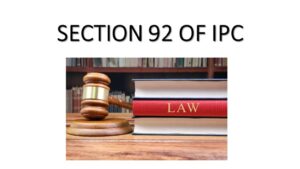Table of Contents
INTRODUCTION
Section 92 of the Indian Penal Code defines An act done in good faith without consent.
Section 92
It defines as not even a single act or thing is a crime if such reasons are present:
- If any harm is caused to a person for whose benefit it is done in good faith, even without the person’s consent, and
- Even when the circumstances were such that it was impossible for that person to signify consent, or
- That the person was incapable of giving consent, and
- Also, the person has no guardian or any other person in lawful charge of him from whom it is possible to obtain consent in time for the thing to be in benefit.
‘Arjun’ was driving at night and suddenly his car crashed and he became unconscious. Rahul’, a surgeon, finds that surgery has to be done. So Rahul without the consent of Arjun but in good faith and for his benefit performs surgery before ‘Arjun’ gains the power to judge. so in that case Rahul has not committed any offence.

Exception
- The doer cannot take advantage of this Section if he does the act intentionally to cause death or intentionally attempts to cause death.
- If the doer knows that such an act if done then the result is likely to cause death then he cannot be benefited under this Section.
- The doer should not extend the act to voluntarily causing hurt or even attempting to cause hurt.
- The doer should not enhance his act in order to instigate or abet any person to make him commit an offence.
Example
A is in a house that is on fire with her child. There are a few people outside holding a blanket to save both of them. From the top A drops the child knowing that this action is likely to cause the death of the baby but not intending to kill and in good faith A drops her child to save him in good faith. Here if something happens to the baby A has not committed any offense and will not be held guilty.
Essentials of Section 92
- An act is done for the benefit of a person who suffers harm.
- The act done must be in good faith.
- There was no time to obtain the consent of the person.
- Where it is impossible to signify the consent of that person.
- There was no guardian or lawful in charge of that person to obtain the consent.
Section 93 Communication is made in good faith even though harm may ensue to the person to whom it is made for the benefit of that person.
It states that if anything is communicated to someone else in good faith and for the benefit of that person it is not an offense even if the communication the persons to suffer any harm.
CASE LAWS
Dasrath Paswan v. State (1957)
The accused was a student of class 10. He failed in his exam. he has a wife aged 19 years. he decided to end his life and told about his decision to his wife . his wife asked her to kill herself first and then to kill himself. The accused killed his wife but before he would kill himself he was arrested.
The court held that deceased does not give her consent under the misconception of fact or under the feat of injury and therefore he is entitled to take the benefit of this exception
MUST READ
SECTION 354 OF THE INDIAN PENAL CODE
SECTION 302 OF THE INDIAN PENAL CODE
SECTION 403 IN THE INDIAN PENAL CODE
